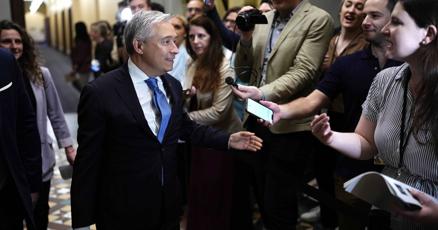When I drove through Banff this morning, the usual tourist bustle had an extra layer of intensity. Black SUVs with tinted windows lined the entrance to the Fairmont Banff Springs Hotel, and security personnel were stationed at strategic points throughout the picturesque mountain town. This isn’t just another busy summer weekend in Alberta’s crown jewel – it’s the gathering of some of the world’s most powerful financial minds.
The G7 finance ministers and central bank governors have descended on our province for a three-day summit that kicked off yesterday. Finance Minister Chrystia Freeland is hosting counterparts from the United States, United Kingdom, France, Germany, Italy, and Japan against the stunning backdrop of the Canadian Rockies.
“The selection of Banff was deliberate,” said University of Calgary economist Trevor Tombe during our conversation last week. “It showcases Canada’s natural beauty while providing the security and isolation needed for such high-level discussions.”
The agenda is packed with heavyweight economic issues. According to federal officials, discussions will center on strengthening global financial resilience, addressing debt vulnerabilities in developing nations, and exploring how to better fund climate initiatives. But the elephant in the room – or rather, the bear in these woods – is the ongoing challenge of inflation.
Bank of Canada Governor Tiff Macklem is expected to share Canada’s recent experience with interest rate policies. Our central bank was among the first to begin cutting rates in June, dropping the benchmark rate to 4.75% after maintaining it at 5% since July 2023. The move signals cautious optimism about Canada’s inflation battle, though many Calgary families I’ve spoken with still feel the pinch at grocery stores and gas pumps.
Janet Yellen, U.S. Treasury Secretary, arrives with different concerns. American inflation has proven more stubborn, hovering at 3.3% compared to Canada’s 2.9%. The difference may seem small, but in macroeconomic terms, it’s significant enough to delay U.S. rate cuts that many investors had been anticipating.
Local business leaders see opportunities beyond the official agenda. “Having the G7 finance summit in Alberta’s backyard puts our province on the global stage,” said Deborah Yedlin, President of the Calgary Chamber of Commerce. “It’s a chance to showcase our economic transition story and attract investment across sectors, from energy to technology.”
The timing couldn’t be better for Alberta. Our province has been leading Canada’s economic growth, with GDP expanding 4.5% last year according to Statistics Canada data. This summit offers a platform to highlight this success story to influential global decision-makers.
Security measures have transformed parts of Banff National Park. The RCMP has established a controlled access zone around the Fairmont, with additional checkpoints throughout the town. For locals and tourists alike, it means slight detours and the occasional traffic delay.
“We’ve been planning these security arrangements for months,” said RCMP Superintendent Gerald Walker. “Our goal is to ensure the safety of these international delegates while minimizing disruption to visitors and residents.”
Not everyone welcomes the high-profile visitors. A coalition of environmental and social justice groups has organized protests near the park gates. Their message: global financial policies must prioritize climate action and economic equality. The demonstrations have remained peaceful, with protesters carrying signs reading “People over Profits” and “Climate Justice Now.”
On the sidelines of the official meetings, a different kind of summit is taking place. Indigenous leaders from Treaty 7 Nations have been invited to share perspectives on sustainable development and traditional knowledge. This inclusion represents a meaningful step toward reconciliation through economic partnership.
“We’re bringing generations of wisdom about caring for this land,” explained Siksika Nation Councillor Samuel Yellow Old Woman. “Our traditional knowledge has much to offer in addressing today’s environmental and economic challenges.”
The summit comes at a pivotal economic moment. Global supply chains are still recovering from pandemic disruptions. The Russia-Ukraine and Middle East conflicts continue to impact energy markets. And the transition to cleaner energy sources – a particularly relevant topic for Alberta – requires massive capital investment.
For Calgary’s energy sector, the summit offers both opportunity and challenge. Industry leaders hope to emphasize the role of Canadian energy in global security, while acknowledging the necessity of emissions reduction. This balancing act mirrors broader tensions within the G7 about energy transition timelines.
As I watch these global leaders navigate Banff’s scenic pathways between meetings, I’m reminded of the stark contrast between the tranquility of these mountains and the turbulent economic waters they’re trying to chart. Their decisions will ripple far beyond this pristine national park, potentially affecting mortgage rates in Bridgeland, business investments in Kensington, and job prospects throughout our province.
The summit concludes tomorrow, but its impact on economic policy may take months to materialize. For now, Banff returns to its regular rhythm – though perhaps with a heightened appreciation for its place on the world stage.







